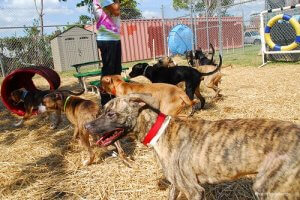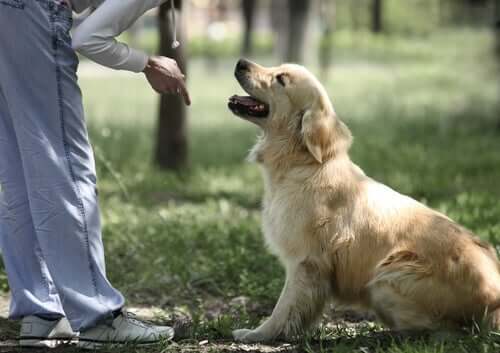How to Choose the Best Dog Obedience School

When you take a puppy home, you can take it to an obedience school so it can learn the basics such as sitting, walking beside you in the park, and how to follow all your instructions. If you want to know how to choose the best dog obedience school, please read the following article!
Do I need to take my puppy to a dog obedience school?
While it’s true that pets can be more or less well-behaved depending on how their owners train them, an obedience school can accelerate the process. Experts can help your dog. Of course, they also help you by making your relationship with your dog more harmonious.

Bear in mind that not all dogs adapt to group training and may need private lessons (even at home). Choosing an obedience school is very important. It’s also essential to make sure that your pet gets along with its trainer. They’ll know the best training method for your dog.
When is it recommended to train a dog? Basically, three groups of dogs should be trained:
1. Puppies
The sooner you start training them, the better. At an early age, dog obedience classes focus on socialization and prevention of certain behavioral problems.
During their development, dogs need to interact with others their age. In addition, puppies should learn not to bark at everything, not to bite objects other than toys, etc. A dog that was trained as a puppy will be less aggressive and more obedient throughout its life.
2. Disobedient dogs
Although it’s best for dogs to be trained at an early age, they can be trained at any time. Even if it may take a while to see results, it’s still worth a try. Dogs with behavioral problems such as aggression or extreme fear or reactivity may benefit a lot from training… even in group settings.
3. Dogs that suffer from anxiety disorders
This problem is common in dogs that spend a lot of time alone because their owners leave for work early and come home late at night. Throughout the day, your pet may feel abandoned and demonstrate it in different ways such as breaking things, peeing everywhere, barking, moaning, etc. Training can help your dog cope with anxiety.
How to choose the best dog obedience school
It’s worth taking your time to choose the best dog obedience school. A good idea is to go to parks with reserved areas for dogs, look for those that behave the best, and ask their owners where they were trained. They may offer valuable information regarding pet trainers and dog obedience schools.
You should also consult your veterinarian. They may recommend some good options and also tell you if they believe your dog needs training or not. Since there are many dog obedience schools to choose from, you must consider:
1. Reputation
This means reading up on the obedience school’s experience, if it guarantees good results, if they treat animals well, if it has many “dog students”, and if the trainers have good reviews, among other things. With all this information, you’ll be able to decide on the best dog obedience school for your furry friend.

2. Training methods
Just like schools for children, each dog obedience school uses different teaching methods. Some believe it’s better to train dogs alone, while others opt for group training sessions. Also, some dog obedience schools divide them by age or particular situation. In any case, you must be certain that the school doesn’t mistreat animals (either verbally or physically).
3. The trainers’ experience
Another aspect to consider when it comes to choosing the best dog obedience school is whether it has qualified trainers. You can find this out directly at the dog obedience school. In addition, you can also analyze each trainer’s curriculum (for example, if they detail the workshops they’ve taken).
Don’t forget that many dog obedience schools aren’t regulated. Therefore, any school without any real knowledge or experience could offer their services on social media platforms.
Main picture source: Brian George
When you take a puppy home, you can take it to an obedience school so it can learn the basics such as sitting, walking beside you in the park, and how to follow all your instructions. If you want to know how to choose the best dog obedience school, please read the following article!
Do I need to take my puppy to a dog obedience school?
While it’s true that pets can be more or less well-behaved depending on how their owners train them, an obedience school can accelerate the process. Experts can help your dog. Of course, they also help you by making your relationship with your dog more harmonious.

Bear in mind that not all dogs adapt to group training and may need private lessons (even at home). Choosing an obedience school is very important. It’s also essential to make sure that your pet gets along with its trainer. They’ll know the best training method for your dog.
When is it recommended to train a dog? Basically, three groups of dogs should be trained:
1. Puppies
The sooner you start training them, the better. At an early age, dog obedience classes focus on socialization and prevention of certain behavioral problems.
During their development, dogs need to interact with others their age. In addition, puppies should learn not to bark at everything, not to bite objects other than toys, etc. A dog that was trained as a puppy will be less aggressive and more obedient throughout its life.
2. Disobedient dogs
Although it’s best for dogs to be trained at an early age, they can be trained at any time. Even if it may take a while to see results, it’s still worth a try. Dogs with behavioral problems such as aggression or extreme fear or reactivity may benefit a lot from training… even in group settings.
3. Dogs that suffer from anxiety disorders
This problem is common in dogs that spend a lot of time alone because their owners leave for work early and come home late at night. Throughout the day, your pet may feel abandoned and demonstrate it in different ways such as breaking things, peeing everywhere, barking, moaning, etc. Training can help your dog cope with anxiety.
How to choose the best dog obedience school
It’s worth taking your time to choose the best dog obedience school. A good idea is to go to parks with reserved areas for dogs, look for those that behave the best, and ask their owners where they were trained. They may offer valuable information regarding pet trainers and dog obedience schools.
You should also consult your veterinarian. They may recommend some good options and also tell you if they believe your dog needs training or not. Since there are many dog obedience schools to choose from, you must consider:
1. Reputation
This means reading up on the obedience school’s experience, if it guarantees good results, if they treat animals well, if it has many “dog students”, and if the trainers have good reviews, among other things. With all this information, you’ll be able to decide on the best dog obedience school for your furry friend.

2. Training methods
Just like schools for children, each dog obedience school uses different teaching methods. Some believe it’s better to train dogs alone, while others opt for group training sessions. Also, some dog obedience schools divide them by age or particular situation. In any case, you must be certain that the school doesn’t mistreat animals (either verbally or physically).
3. The trainers’ experience
Another aspect to consider when it comes to choosing the best dog obedience school is whether it has qualified trainers. You can find this out directly at the dog obedience school. In addition, you can also analyze each trainer’s curriculum (for example, if they detail the workshops they’ve taken).
Don’t forget that many dog obedience schools aren’t regulated. Therefore, any school without any real knowledge or experience could offer their services on social media platforms.
Main picture source: Brian George
This text is provided for informational purposes only and does not replace consultation with a professional. If in doubt, consult your specialist.








